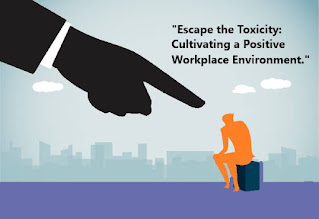Navigating a Toxic Workplace: Strategies for Self-Preservation
The modern workplace can be a dynamic and challenging environment, where employees spend a significant portion of their time. While many offices foster a positive and supportive atmosphere, unfortunately, some workplaces can become toxic, characterized by negative interactions, unhealthy competition, and a lack of respect and empathy. In this article, we will explore effective strategies for handling a toxic environment at the office, allowing you to maintain your well-being and professional growth.
1. Recognize the Signs:
The first step in addressing a toxic office environment is to recognize the signs. These signs may include excessive gossip, bullying, micromanagement, lack of trust, favoritism, or a high turnover rate. By acknowledging these indicators, you can validate your experiences and take appropriate action.
2. Self-Care:
Maintaining your well-being is crucial when dealing with toxicity. Practice self-care by prioritizing your physical and mental health. Engage in activities that reduce stress, such as exercise, meditation, or hobbies. Seek support from friends, family, or a therapist to help navigate the emotional challenges.
3. Set Boundaries:
Establishing clear boundaries is essential for self-preservation. Learn to say no when you are overwhelmed or when a task exceeds your capabilities. Communicate assertively, expressing your limits and expectations to colleagues and supervisors. Setting boundaries will help you maintain a healthy work-life balance and reduce the impact of toxicity on your well-being.
4. Seek Allies:
Identify like-minded colleagues who share your concerns about the toxic environment. Building alliances with supportive coworkers can provide a sense of unity, validation, and strength in numbers. Collaborating with others who are also seeking positive change can empower you to address the toxicity collectively.
5. Focus on Your Goals:
Toxic environments often distract individuals from their professional goals and growth. Keep your long-term objectives in mind and maintain a positive attitude. Concentrate on enhancing your skills, seeking out learning opportunities, and expanding your professional network. By focusing on personal development, you can stay motivated and maintain a sense of purpose despite the toxicity around you.
6. Document Incidents:
Keep a record of any toxic incidents or inappropriate behavior that you encounter. Maintain a detailed log including dates, times, and descriptions of events. This documentation will serve as evidence if you decide to escalate the situation to management, human resources, or higher authorities. Be sure to follow your company's established procedures for reporting such incidents.
7. Seek Support from Management or HR:
If the toxic environment persists and affects your well-being and productivity, consider approaching management or the human resources department. Present your concerns in a constructive manner, backed by your documented incidents. Request a meeting to discuss the issues, seeking potential solutions or interventions. It is important to give your employer an opportunity to address the situation and rectify the toxic environment.
8. Explore External Opportunities:
While addressing the toxic environment internally should be the first approach, sometimes it may be necessary to explore external job opportunities. Prioritize your mental health and overall well-being when considering a change in employment. Seek a workplace that aligns with your values, fosters a healthy environment, and promotes growth and positivity.
Conclusion:
Dealing with a toxic office environment can be challenging, but it is crucial to prioritize your well-being and professional growth. By recognizing the signs, practicing self-care, setting boundaries, seeking allies, and focusing on your goals, you can navigate the toxicity more effectively. Remember that you have the power to take action, whether by documenting incidents, approaching management or HR, or exploring external opportunities. Your well-being is essential, and by taking steps to address the toxic environment, you are investing in your own success and happiness.




Comments
Post a Comment